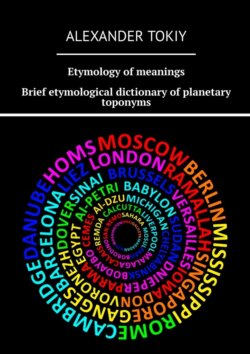Читать книгу Etymology of meanings. Brief etymological dictionary of planetary toponyms. At the origins of civilization - Alexander Tokiy - Страница 4
To the Descendants of Sisyphus
(instead of a Preface)
ОглавлениеMy ancestors went back to the ancient Greeks, who left mankind an incredibly rich gallery of symbolic meaning and intimate knowledge of mythological images. They inherited knowledge from the depths of centuries and created a fascinating and confusing world of heroes and gods. One of them was Sisyphus, the founder and king of Corinth, who tried to cheat death, for which he was condemned to the severe punishment by the gods – always lifting a heavy stone up the mountain. As soon as he reached the top, the stone would fall under its weight, and poor Sisyphus would come back for it and roll it up the mountain again and again. It became a symbol of painful but useless meaningless and fruitless labour and in the twentieth century French existentialists was raised to the banner of the absurdity of human existence.
Everything is so obvious, but it is far from true. Only one intuition about the meaninglessness of “Sisyphean labour” goes back to the ancient “semantic” understanding of the myth of Sisyphus. The stone that he rolled up the mountain is actually the stone of knowledge. We reach extreme heights with the age, but everything is reset with our departure. There is only a stone at the foot of the mountain, waiting for the touch of new and young hands. The ancients understood the mechanisms of knowledge transfer well and they knew the main “enemy”—the loss of continuity, the absence of someone who will pick up the baton. No one learns from other people’s mistakes, preferring to make their own, repeatedly multiplying and distorting the original meanings.
Since ancient times, people have tried to put knowledge in a variety of forms: in words, fairy tales, legends, metaphors, hoping that these tips will help understanding and knowledge of the world. But the descendants of the ancient perceived “signals” as a fun puzzle, and were often understood literally, without hidden meaning. Abraham Maslow’s famous dictum that civilization is a form of struggle against entropy, the loss of cultural heritage, explains the difficulties that humanity has faced in passing on knowledge to the next generation best of all. This also applied to language – the main means of communication, the most subtle tool for transmitting information, with the slightest error of which meanings could be lost, changed and disappear.
The easiest way of it can be seen in the etymology, and especially in the interpretation of place names. This is an amazing legacy left to us in the names of localities – a legacy visible, audible, easy to understand and always rough to the touch. Thousands and thousands of years ago, our ancestors gave names to the places where they lived. The laws of the language development began with these names, with the primal concepts that I tried to discover during my life in the course of independent searches. I could be wrong in some ways, but I could not resist the temptation to “roll” this “toponymic boulder” on the mountain of knowledge. I hope you will be interested.
